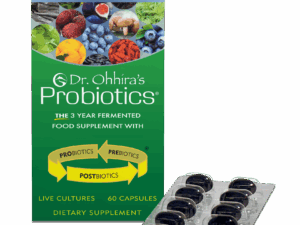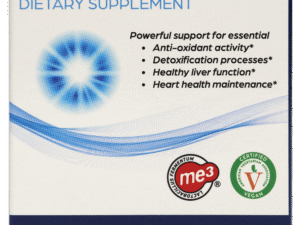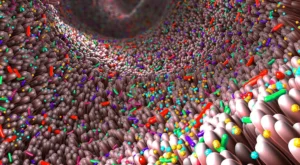Original Post Date: July 17, 2020
Maintaining a healthy microbiome is now recognized as one of the most critical factors regarding overall health. Thus, whenever the microbiome is damaged or disrupted, steps should be taken as soon as possible to reestablish a healthy microbiome.
Many people consider commercial probiotic products to be the best way to reestablish a healthy microbiome. However, some microbiome scientists are now suggesting that directly delivering postbiotic metabolites is a faster and more effective method of accomplishing rapid microbiome restorationi Postbiotic metabolites is the term that refers to the wide range of health-regulating compounds that bacteria produce and secrete in the intestinal tract (primarily in the colon) when they digest and ferment the fiber content in the foods we eat.
Colonoscopies are universally recognized as the most accurate test for colorectal cancer and early detection saves lives. Colorectal cancer is the 2nd leading cause of cancer-related deaths in the U.S. In 2023, approximately 153,000 people were diagnosed and over 52,000 Americans died from colorectal cancer.ii Approximately 15 million colonoscopies are performed in the U.S. each year and it is generally recommended that adults aged 50–75 should have a colonoscopy every 10 years.
Colonoscopies are quite safe when performed by doctors who have experience performing the procedure. However, recent studies have reported that side effects from colonoscopies are more common than previously reported.iii It is hypothesized that some of these symptoms are related to alterations in gut microbiome that result from the procedure used to cleanse the bowel in preparation for a colonoscopy.iv
-
 Dr. Ohhira’s Probiotics®$13.95 – $89.95Price range: $13.95 through $89.95
Dr. Ohhira’s Probiotics®$13.95 – $89.95Price range: $13.95 through $89.95 -
 Dr. Ohhira’s® Probiotics Professional Formula$39.95 – $129.65Price range: $39.95 through $129.65
Dr. Ohhira’s® Probiotics Professional Formula$39.95 – $129.65Price range: $39.95 through $129.65 -
 Reg´Activ® Essential ME-3$39.95
Reg´Activ® Essential ME-3$39.95
Colonoscopies Disrupt Your Microbiome
The most common side effects following a colonoscopy are pain and abdominal swelling or bloating. A study published in 2015 reported that 20% of patients experience pain for two or more days following a colonoscopy. In a double-blind, placebo-controlled trial, patients who took probiotics after their colonoscopy had 30% fewer days of pain following their colonoscopy.v
Taking Probiotics Before Colonoscopy Can Help
In another double-blind, placebo-controlled trial, 104 patients with constipation were given probiotics or a placebo daily for two weeks before their pre-colonoscopy bowel prep procedure. Pre-treatment with probiotics resulted in more effective bowel cleansing, improved colonic mucosa visualization during the colonoscopy and reduction of intestinal distress symptoms following the colonoscopy.vi
Post-Colonoscopy Microbiome Restoration
Probiotic supplements like Dr. Ohhira’s Original Formula are a good choice for improving digestive health before and after your next Colonoscopy!
Colonoscopy Bowel Prep Causes Long-Term Microbiome Disruption
Polyethylene glycol (PEG) is a commonly used agent to clean out the bowel prior to a colonoscopy. Studies have revealed that PEG bowel cleansing results in long-lasting disruption in the microbiome. In one study, one month following a colonoscopy, the participants were found to have a significant decrease in beneficial strains of Lactobacilli and a significant increase Proteobacteria, which can cause diarrhea.vii
Post-Colonoscopy Infections Up To 100x Higher Than Previously Thought
A study published in the May 2018 reported that the rates of infections following a colonoscopy performed at ambulatory surgery centers (ASCs) were more than 100 times higher than expected.viii
ASCs are outpatient facilities where patients can have minor procedures performed without going into a hospital. ASCs have been around for several decades, but their popularity has increased greatly in recent years as patients have looked for less expensive and more convenient alternatives to traditional hospital settings.
Don’t Avoid Your Colonoscopy
Colonoscopies are the most important screening procedure to help detect colorectal cancer early. Consequently, screening colonoscopies decrease the risk of developing as well as dying from colorectal cancer..ix The purpose of this article is NOT to frighten or suggest that people should avoid a colonoscopy. Instead, this article is meant to encourage gastroenterologists and the general public to take proactive steps to maintain reestablish a healthy microbiome following a colonoscopy. The studies reviewed in this article indicate that taking probiotics before and/or following a colonoscopy will help to reduce the incidence of side effects and enhance the immune system to prevent post-colonoscopy infections. The fastest and most effective method of reestablishing a healthy microbiome is to directly ingest a product that delivers a combination of probiotics, prebiotics, and postbiotic metabolites, such as Dr. Ohhira’s Probiotics.
Restoring the Gut Microbiome After a Colonoscopy
The bowel cleansing procedures before a colonoscopy cause significant damage to the gut microbiome. In fact, it has been reported that colonoscopy-bowel prep procedures result in long-lasting damage to the gut microbiome. x
Dysbiosis = Immune Dysfunction
Scientists estimate that between 70 – 80% of the body’s immune cells are located in the gastrointestinal tract.xi,xii
This part of the gut microbiota is a complex relationship and interaction between the lymphoid cells that reside in the lining of the GI tract, the bacteria in the intestinal tract and the postbiotic metabolites produced by the intestinal bacteria.
A healthy microbiome is generally thought to consist of approximately 85-90% beneficial bacteria and only 10-15% “bad” bacteria. xiii, xiv
Dysbiosis, or a pathogenic microbiome, causes immune dysfunction, which increases the risk of developing disease.xv Therefore, whenever the normal microbiome balance is upset or disturbed, quick action should be taken to reestablish the predominant abundance of beneficial probiotic bacteria and postbiotic metabolites.
Many people take high-dose probiotics to correct bacterial imbalance in the gut microbiome. However, at Essential Formulas, we recommend the following 2-step protocol, which we believe is a more effective way to make improvements in the gut microbiome.
- Increase your consumption of plant-based foods, especially fruits and vegetables, which supply fibers and polyphenols that are the food for your probiotic bacterial. This will promote the growth and proliferation of your own innate strains of probiotic bacteria and help them reestablish their dominance. For information on how to make fiber and polyphenol-rich salad that promotes a healthy gut microbiome, do a search for Dr. Ross’ 8-minute YouTube video: Ross’s Salad Buzz at https://www.youtube.com/watch?v=IwEfAW70W2I
- Take Dr. Ohhira’s Probiotics, which contain over 500 postbiotics in each dose. Directly ingesting the postbiotic metabolites is the fastest way we know of to make beneficial changes in the gut microbiome. Various postbiotic metabolites make the ecosystem more acidic, which promotes the growth of probiotic bacteria and inhibits the growth of pathogens, enhance the immune system, and much more.
Maintaining a healthy gut microbiome is critical for gut health and overall health. In addition to helping people maintain a healthy gut microbiome, the steps outlined above will accelerate microbiome recovery following a colonoscopy procedure.





